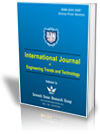Study of Anode Shape Prediction in Through Mask Electrochemical Micro Machining
Citation
Vikram Singh, Pankaj jain, Dilip Gehlot "Study of Anode Shape Prediction in Through Mask Electrochemical Micro Machining", International Journal of Engineering Trends and Technology (IJETT), V46(6),320-326 April 2017. ISSN:2231-5381. www.ijettjournal.org. published by seventh sense research group
Abstract
Electrochemical micromachining (EMM)
appears to be a promising technique, since in many
areas of application, it offers several special
advantages that include higher machining rate, better
precision and control, and a wider range of materials
that can be machined.
Electrochemical machining for a hole is a complex
phenomenon because it is involving two phase fluid
dynamics, unsteady state heat transfer, electric field
distribution, mass transfer, electrochemistry etc.
between moving boundaries. Therefore Anode (work)
shape prediction models are complicated.
This paper is reviewed different model for analysis
problem ie anode shape prediction. With finite
element method, the anodic dissolution process is
predicted.
References
[1] VK. Jain · Y. Kanetkar · G.K. Lal current attack and
stagnation zones in electrochemical drilling © Springer-
Verlag London Limited 2005
[2] Acharya BG, Jain VK, Batra JL (1986) Multi-objective
optimization of the ECM process. Precis Eng 8:88–95
[3] Konig W, Pahl D (1970) Accuracy and optimal working
conditions in ECM. Ann CIRP 18:223–230
[4] Tipton H (1971) Calculation of tool shape for ECM. In: Faust
CL (ed) Fudamentals of ECM, pp 87–102
[5] Hopenfeld J, Cole RR (1966) ECM – prediction and
correlation of process variables. Trans ASME J Eng Ind
88:1–7
[6] Jain VK (1980) An analysis of ECM process for anode shape
prediction. Ph.D. Dissertation, University of Roorkee
[7] Jain VK, Panday PC (1981) Tooling design for ECM – a
finite element approach. J Eng Ind Trans ASME 103:183–
190
[8] Narayanan OH, Hinduja S, Noble CF (1986) The prediction
of workpiece shape during ECM by boundary element
method. Int J Mach Tool Des Res 26(3):323–338
[9] Eason, B. Noble, and I.N. Sneddon, ?On certain integrals of
Lipschitz-Hankel type involving products of Bessel
functions,? Phil. Trans. Roy. Soc. London, vol. A247, pp.
529-551, April 1955. (references)
[10] Dr. V.K. Jain & K.P. Rajurkar ? An integrated approach for
tool design in ECM? April 1991 Vol 13 No 2 Butterworth
Heinemann
[11] Tipton, H. The Dynamics of Electrochemical Machining,
Proc 5th Int Machine Tool Design and Research Cant, 1964,
509 522
[12] Konig W. et al Mathematical model for calculation of contour
of the Anode in Electrochemical Machining, Ann CIRP, 25
1977, 83-87
[13] Tsuei, Yo G. et al Theoretical and Experimental Study of
Workpiece Geometry in Electrochemical Machining, Trans
ASME, 1977, 76-WA/Prod, I-5
[14] Narayanan, O. H., Hinduja, S. and Noble, C. F. The
Prediction of Workpiece Shape during Electrochemical
Machining by the Boundary Element Method, Int J Mach
Tool Des Res, 26(3), 1986, 323-338
[15] Jain, V.K. (2005), ?Advanced Machining Processes, Allied
Publishers, N. Delhi.
[16] Li Wang et.al, Finite element simulation and experimental
study on the through-mask electrochemical micromachining
(EMM) process Springer-Verlag London Limited 2010
[17] Zhu D et. al, Electrochemical micromachining of
microstructures of micro hole and dimple array CIRP
Annals - Manufacturing Technology 58 (2009) 177–180
[18] Zhu D, Wang K, Yang J-M (2003) Design of Electrode
Profile in Electrochemical Manufacturing Process. Annals of
the CIRP 52/1:169–172.
[19] Jain VK, Pandey PC (1981) Tooling design for ECM—a
finite element approach. J Eng Ind 103(5):183–191
[20] Matthias et al, ?Design of Electrochemical Machining
Process by Multiphysics Simulation? COMSOL Multiphysics
Conference. ol. III, G.T. Rado and H. Suhl, Eds. New York:
Academic, 1963, pp. 271-350
[21] D. Landolt, P.-F. Chauvy, O. Zinger, ?Electrochemical
micromachining, polishing and surface structuring of metals:
fundamental aspects and new developments 2003 Elsevier
Science Ltd. All rights reserved.doi:10.1016/S0013-
4686(03)00368-2
Keywords
Electrochemical Machining
Electrochemical micromachining, tool designing,
anode shape prediction



